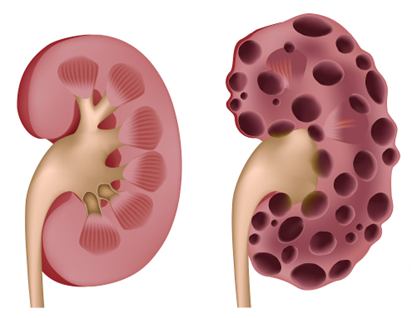What is polycystic kidney disease?
Polycystic Kidney Disease (PKD) is a genetic disorder characterized by the development of numerous fluid-filled cysts in the kidneys. These cysts interfere with kidney function over time. At Clinical Renal Associates, we provide compassionate care and advanced treatments to help manage PKD and support your health.
How common is PKD?
PKD is among the more common inherited kidney disorders, affecting about 1 in every 400 to 1,000 people globally. ADPKD accounts for the majority of cases, while ARPKD is much less common.

What Types of PKD Are There?
There are two primary types of PKD:
- Autosomal Dominant PKD (ADPKD): The most common form, often showing symptoms in adulthood. ADPKD is inherited in an autosomal dominant manner, meaning that just one copy of the mutated gene from either parent can lead to the development of the disease.
- Autosomal Recessive PKD (ARPKD): A rarer form that usually appears in infancy or early childhood. In autosomal recessive PKD, the disease develops only when a child inherits one mutated gene from each parent.
Who is More Likely to Have PKD?
Certain factors can increase the likelihood of developing PKD:
- Family History: PKD often runs in families, so having a close relative with the condition can raise your risk.
- Genetic Factors: Inherited mutations in specific genes are responsible for PKD.
- Age: ADPKD symptoms usually appear in adulthood, while ARPKD appears in infancy or early childhood.

What Causes PKD?
The condition is triggered by genetic mutations that cause cysts to grow in the kidney tissue. The cysts eventually can lead to decreased kidney function. Cysts can also cause high blood pressure, which, if not treated, can lead to faster loss of function.
Medications: Prescribed both to manage high blood pressure and to directly protect the kidneys, resulting in slower progression of kidney function loss.
What Are the Signs and Symptoms of PKD?
Symptoms of Polycystic Kidney Disease (PKD) may differ from person to person, but frequently observed signs include:
- Abdominal Pain: Discomfort or pain in the lower back or sides.
- Frequent Urination: A heightened need to urinate more often, particularly during the night.
- High Blood Pressure: Elevated blood pressure levels.
- Blood in Urine (hematuria): Can cause urine to appear pink, red, or brown-coloured.
- Kidney Stones: Cysts can cause painful stones to develop.
What Are the Possible Complications of PKD?
PKD can lead to several complications, including:
- Kidney Failure: Gradual loss of kidney function over time.
- High Blood Pressure: A persistent rise in blood pressure that may accelerate kidney damage.
- Urinary Tract Infections (UTIs): Increased risk due to cysts.
- Kidney Stones: Formation of stones that can cause pain and blockages.
How is PKD Diagnosed?
PKD is typically diagnosed through a combination of:
- Medical History: Discussing details about your symptoms and any family history with your physician.
- Physical Examination: Checking for signs of kidney enlargement or other symptoms.
- Imaging Tests: Ultrasound, CT scans, or MRI to visualize cysts and kidney structure.
- Genetic Testing: Used to verify the diagnosis, particularly when there is a known family history of PKD.

What is the Treatment for PKD?
The treatment of Polycystic Kidney Disease (PKD) focuses on controlling symptoms and slowing the progression of the disease.
- Medications: Prescribed to manage high blood pressure and alleviate.
- Lifestyle Changes: Includes dietary adjustments, staying hydrated, and exercise to support kidney health.
- Regular Monitoring: Routine check-ups to monitor kidney function and manage complications.
Can I Prevent PKD?
PKD is an inherited condition, so it cannot be prevented. However, early diagnosis and proactive care can help manage symptoms and improve quality of life.
What Can I Do to Slow Down PKD?
While PKD cannot be cured, certain lifestyle modifications can help slow disease progression.
- Manage Blood Pressure: Keep your blood pressure under control with medication and lifestyle changes.
- Stay Hydrated: Drinking adequate fluids may lower the risk of developing kidney stones and infections.
- Adopt a Healthy Diet: Focus on a balanced diet low in salt and processed foods.
- Exercise Regularly: Incorporate consistent physical activity into your routine to improve your overall health and well-being.
At Clinical Renal Associates, we are committed to providing expert care and support for individuals with Polycystic Kidney Disease. Our dedicated team works with you to effectively manage your condition and enhance your quality of life. If you have any questions or need guidance, don’t hesitate to contact us. We’re here to support you at every stage of your journey.
